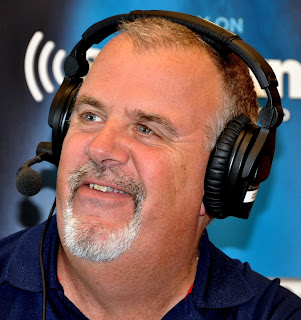NASCAR announced today that three of the top four finishing cars in last Sunday’s
AAA Texas 500 at Texas Motor Speedway
had failed post-race technical inspections at the sanctioning body’s Research
and Development Center in Concord, NC.
Winner Kevin Harvick received an L1
penalty – the most severe in the sport -- for illegal modifications to his car’s
rear spoiler. Runner-up Ryan Blaney’s machine was found
with unapproved door front crush panels and fourth-place finisher Erik Jones’
car had infractions on the body and package tray that allowed air to flow
illegally from inside the car. Both are grounds for L1 penalties.
Harvick lost 40
championship driver and owner points, leaving him just three points above the cutoff
line for advancement to next weekend’s season finale at Homestead Miami
Speedway, Additionally, he will be without the services of crew chief Rodney Childers and
car chief Robert Smith for the remainder of the season. Blaney and Jones each forfeited
20 points, with their crew chiefs fined $50,000 and their car chiefs suspended
from the next two races.
This is not the
first time NASCAR has busted race winners or other front runners with illegally
modified cars. It happens all too often these days, and every time, the topic of
water cooler talk changes instantly from what happened on the race track to
what happened at the R&D Center.
There are a
number of problems with that scenario and -- fair warning -- you’ve heard them
all before.
NASCAR does itself a grave disservice in times like these by refusing to
reveal the specifics of the violations. Were they something that was done quickly
and clandestinely during a pit stop? Or were they something more nefarious, requiring
weeks of planning and preparation at the shop, before somehow avoiding
detection during multiple pre- and post-race inspections?
 |
| Harvick now in playoff danger |
By not providing specifics, NASCAR allows – even encourages – fans to
engage in wild speculation, ranging from a simple strip of tape to a complex, mechanical
device that alters the angle and effect of the rear spoiler. Nothing good comes
from speculation, and a simple explanatory statement from the sanctioning body
could eliminate days of needless conjecture, with one stroke of the pen.
NASCAR also suffers from the timing of announcements like today’s. Ours is
the only professional sport that throws a flag and walks-off penalty yardage,
72 hours after the game has ended. The fact that Kevin Harvick was the winner
on Sunday, still the winner on Monday and STILL the winner on Tuesday… only to
forfeit some of the proceeds of that win on Wednesday is patently inexplicable
to casual fans.
The optics are all wrong.
Today’s announcement – and others like it in the past – raise questions about the efficacy of the numerous at-track inspections conducted during race weekend. Granted, NASCAR is the only professional sport that
includes a 3,400-pound mechanical device with literally thousands of moving
parts. But if we’re missing serious violations like this at the race track –
repeatedly -- perhaps it’s time for NASCAR to make fundamental changes to the
inspection process, adding a lengthier, more stringent post-race examination for
front-running cars.
Unfortunately, the problems do not end once the infraction is found.
NASCAR is also the only
professional sport that allows competitors to keep a significant portion of
their ill-gotten gains. Harvick’s Stewart Haas Racing team earned a total of 60 championship
points Sunday, with what NASCAR says was a seriously non-compliant race car. They
were penalized only 40 of those 60 points, however, walking away with the equivalent of
a 17th-place finish and -- more important – allowed to maintain
their position just above the playoff cut line. For the record, NASCAR’s Penalty Grid calls
for a deduction of between 10 to 40 championship points for an L1 penalty of this
type, meaning that the sanctioning body dropped the heaviest hammer currently allowed
by law. Based on the number of L1-level violations we’ve seen this season, however,
perhaps it’s time for a new law and a heavier hammer.
Based on the current, widespread lack of compliance in the garage, It may
be time for NASCAR to sharpen its teeth to a finer point and take a more meaningful
– and painful -- bite out of crime.
A word now, if I may, on the view being expressed in some corners that teams
should not be penalized for infractions that evade detection earlier in the
weekend. That makes as much sense as saying, “If you make it out the front door
of the bank with a bag full of money, the cops should not be allowed to arrest
you 20 miles down the road.”
If you catch your teenage daughter climbing out of her bedroom window at 2
AM, the excuse that, “I did it last night and didn’t get caught” is not going
to hold much water. Right is right, wrong is wrong and illegal is illegal, no
matter when you get caught with your hand in the cookie jar.
The saddest part of today’s announcement is that it once again
reinforces NASCAR’s image as the sport where everybody cheats and nobody cares.
In the next four hours, we will hear from a plethora of NASCAR fans espousing such
tired old lines as “you’re not cheating until you get caught,” and “if you’re
not cheating, you’re not trying hard enough.”
I continue to hope for a certain degree of hypocrisy on the topic,
hoping that NASCAR fans apply a higher standard of conduct to themselves and
their children than they do to their favorite sport.


No comments:
Post a Comment